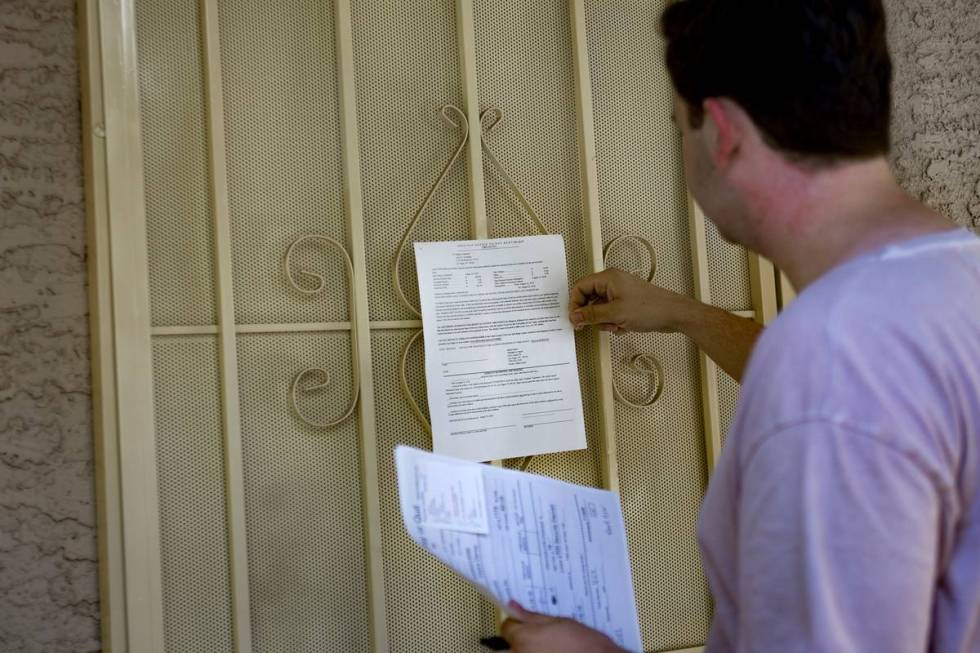Here’s what you need to know for when Nevada’s eviction moratorium lifts

Gov. Steve Sisolak announced Monday that the state’s eviction moratorium will be extended an additional 45 days.
When that happens, experts expect a flood of eviction notices to renters to follow.
In March, Sisolak announced a temporary halt to residential landlords evicting their tenants based on non-payment of rent — a move aimed at helping Nevadans who were facing a financial crisis sparked by the economic impact of the novel coronavirus.
An estimated 249,700 Clark County residents, or more than 10 percent of its population, are at risk of eviction, according to a report by Las Vegas research group Guinn Center and the COVID-19 Eviction Defense Project in Denver.
Sisolak also enacted legislation in August giving renters additional time to explore alternative solutions with their landlord such as third-party mediation.
Las Vegas attorney Terry Moore of Marquis Aurbach Coffing said it should be made clear renters have time to resolve an eviction notice.
“There’s a lot of misinformation going out there,” he said. “People are thinking they’re going to get a notice and be on the streets the following weekend. That’s not the way it happens.”
He said it’s likely there will be a wave of evictions, but it won’t be a “tsunami.”
“Landlords aren’t in the business of evicting people. They’re in the business of renting homes and collecting rent and it’s to everybody’s advantage if that can be maintained,” he said.
Moore spoke with the Review-Journal about what tenants can expect and what options are available to them.
The interview has been edited for length and clarity.
When would someone receive an eviction notice?
It depends on the lease. Some leases say the rent is due on the 1st but it’s not (considered) late until the 5th so tenants should always read their leases. That’s one of the most important things that they should do. If somebody’s rent is due on Sept. 1 and it’s considered late Sept. 2 they can get served (by the landlord) on Sept. 2. They’ll receive a seven-day notice to quit or pay rent and that’s seven judicial days — Las Vegas, the jurisdiction of unincorporated Clark County and North Las Vegas and Henderson don’t count Fridays — so they would likely have until Sept. 15 to file an answer to the eviction. There’s a tenant answer form at the Civil Law Self-Help Center, which is a fantastic resource for tenants, and you can find that information online at civillawselfhelpcenter.org.
How does the eviction process work?
The tenant would file his or her answer. The landlord has the next move of filing the landlord’s complaint of summary eviction. Then, the court will set a hearing. In a normal world, the hearing would be set the following week, but that may get pushed back a little bit if there’s an overwhelming number of filings around that time. The court may simply not have enough hours in the day to set all of the hearings.
What happens during a hearing?
The landlord goes first because they filed the notice and will say, ‘Your honor, this is on a seven-day pay rent or quit. The tenant hasn’t paid rent for ‘X’ number of months for ‘X’ amount.’ It’s pretty straightforward. Then the tenant comes in, and there’s legal defenses they can articulate. If they can convince the judge they have sufficient grounds and evidence to establish one of those defenses then the judge will grant it or deny it. But the judge will give everybody a full chance to present their case. If the eviction gets granted then instructions go to the constable in a day or two and the constable has to go out and post a 24-hour notice of a lockout.
What happens if a tenant ignores an eviction notice?
It just proceeds a little faster. For example, if a tenant had until Sept. 15 to answer and they don’t answer then the landlord files their complaint for eviction Sept. 16 and it’s granted by the court. It may be delayed because of the quantity, but in a normal world it would get granted that day (Sept. 16) or the next day because it was unopposed. Then the notice gets sent to the constable office, who posts the 24-hour notice and comes back and does the lock out.
What should tenants keep in mind?
What a lot of people don’t realize is a landlord is not supposed to file their complaint for eviction if the tenant has vacated the unit. So, if a tenant moves out before the hearing is held, or before the eviction is granted there’s no eviction because they left. This would help a renter to avoid having an eviction on their record. That, coupled with the county’s new ordinance that makes it illegal for landlords to discriminate against a tenant for having an eviction related to COVID-19, makes it kind of an incentive for tenants to just leave early before they get evicted.
The other thing tenants need to be aware of during this process is they can file a motion for a stay — they can ask for additional time.
I believe that the courts are going to be very liberal in granting those. Tenants can only ask for up to 10 days, even at the hearing.
If you’re at the hearing and it’s clear you’re going to lose, the tenant can ask for more time. And if a tenant truly feels that they’re aggrieved — that the judge didn’t really listen to anything they’ve said and they have a solid ground for why they shouldn’t have been evicted — they can always appeal the decision to the district court.
That stops the eviction process until the district court considers it.
A previous version of this story incorrectly reported the status of SB1. Gov. Steve Sisolak signed the bill into law.
Contact Subrina Hudson at shudson@reviewjournal.com or 702-383-0340. Follow @SubrinaH on Twitter.